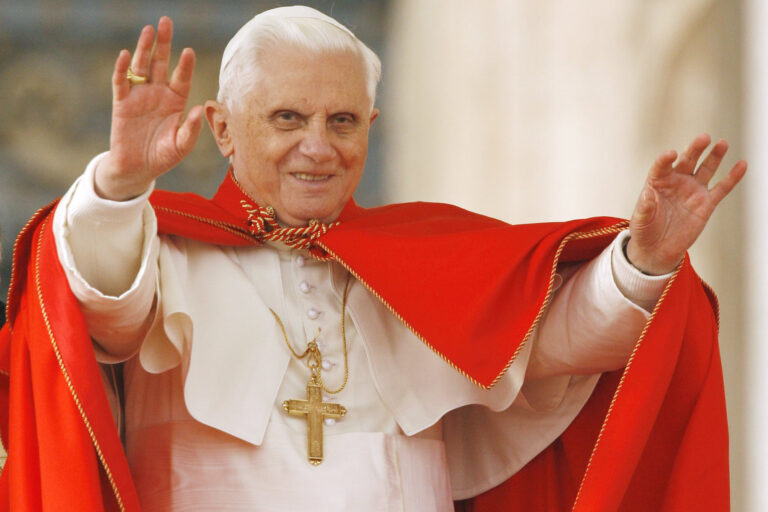Many theologians and bishops from Benedict’s German homeland are calling for a wait-and-see approach in the debate about a rapid beatification and canonisation of the late former pope, even though they agree he was without doubt an outstanding theologian.
At his funeral on Thursday, calls of “Santo Subito” rang out across St Peter’s Square, referring to an accelerated beatification and canonisation as happened with John Paul II. In addition, some cardinals said Benedict XVI was already on a par with the only 37 so-called “Doctors of the Church”, all of whom are saints.
His long-time private secretary, Archbishop Georg Gaenswein, also said in an interview that he believed “it will go in this direction”. The author Peter Seewald, Benedict’s biographer, had recently expressed a similar view.
The first to advise restraint was the president of the German Bishops’ Conference, Bishop Georg Baetzing, who said after the funeral: “I don’t think now is the time”.
Baetzing said the Church had a good, tried and tested procedure for beatifications that provided for a period of calm, reflection and prayer in the first five years after the person’s death. In that way, decisions could mature.
German Cardinal Walter Kasper told the Italian newspaper La Repubblica that one did not travel to heaven on a high-speed train. He said the waiting period of five years after death, which is laid down by canon law, was a very cautious and wise approach.
Cardinal Gerhard Ludwig Mueller, former head of the Vatican Congregation for the Doctrine of the Faith, added that for him personally, Benedict XVI with his outstanding theology already belonged to the Doctors of the Catholic Church. But defining this for the Church as a whole was subject to a fixed procedure, he said.
Regensburg Bishop Rudolf Voderholzer, in an interview with the Catholic weekly newspaper Die Tagespost, avoided making a statement on the speed of the procedure and said: “Beatification and canonisation happen first through the faithful”. In the case of sufficiently broad and comprehensively attested veneration, it was the task of the church to examine the extent to which the person was worthy of the public veneration, also taking into account all critical aspects. “The fact is that countless people worldwide see in Benedict a teacher and shepherd who was decisively important for their lives and paved the way to faith for them. I can say the same about myself.”
Bishop Peter Kohlgraf of Mainz paid tribute to Benedict XVI as “one of the great figures of the century” and as a man of historical significance. But he too urged restraint in making a final assessment of his life. “In view of some of the topics that were under discussion even before his funeral, including his possible canonisation, I would encourage calm.”
Even a great theologian, bishop and pope had flaws that needed to be placed in the overall picture, Kohlgraf said. “For this, too, it takes time and distance, and it requires people who take on this evaluation without a theological or church-political self-interest.”
Thomas Schueller, a canon lawyer from Muenster, also recommended a wait-and-see approach. The canonisation of popes should not “degenerate into a cheap automatism”, he wrote on Tuesday in a guest article for the website of the diocese of Muenster.
Under canon law, a beatification process could only begin in five years at the earliest, he added. At the same time, the files on a deceased Pope would only be available for scholarly study after 60 years had elapsed. “Until then, all assessments – however earnest they may be – are subject to a limited knowledge of the sources.”
Schueller said he was convinced that based on what was known today on the subject of abuse, even Pope John Paul II would probably not have been canonised as he had “demonstrably ignored the cry of the victims and protected the perpetrators”.
Norbert Luedecke, a canon law expert from Bonn, also recommended that the Catholic Church should exercise caution and restraint. It was true that Pope Francis had the power to decide on a beatification and canonisation without observing deadlines, he told German regional broadcaster WDR. Nevertheless, it would be in the interest of the Church to wait with regard to Joseph Ratzinger. In addition, the impact of canonising popes could “wear out”, if it happened frequently.
Luedecke referred in this context to controversial decisions by Cardinal Joseph Ratzinger/Pope Benedict. As head of the Congregation for the Doctrine of the Faith and thus as a “doctrinal policeman”, he had for years destroyed the careers of theologians who held a different view on questions of faith. Also – as with John Paul II – many questions remained unanswered with regard to the handling of abusers. “I don’t think we should get carried away” said the theologian. “Thoroughness is more important than speed here.”
Earlier, Catholic theologian Oliver Wintzek, who teaches in Mainz, had joined warnings against quickly elevating Benedict XVI to Doctor of the Church or beatifying him. “One would actually want to relieve him of criticism by doing so,” the dogma expert told a Cologne-based church website.
The theologian also criticised “inflationary beatifications and canonisations of popes” in the recent past. “This is intended to elevate this office structure into the aura of the sacrosanct, so to speak,” he said.
Instead, he suggested initiating a discussion on whether critical theologians, some of whom have been reprimanded by the Vatican, such as Karl Rahner, Hans Kueng, Johann Baptist Metz and Leonardo Boff, should not also be elevated to the status of Doctors of the Church.
*Originally reported by KNA Germany.



